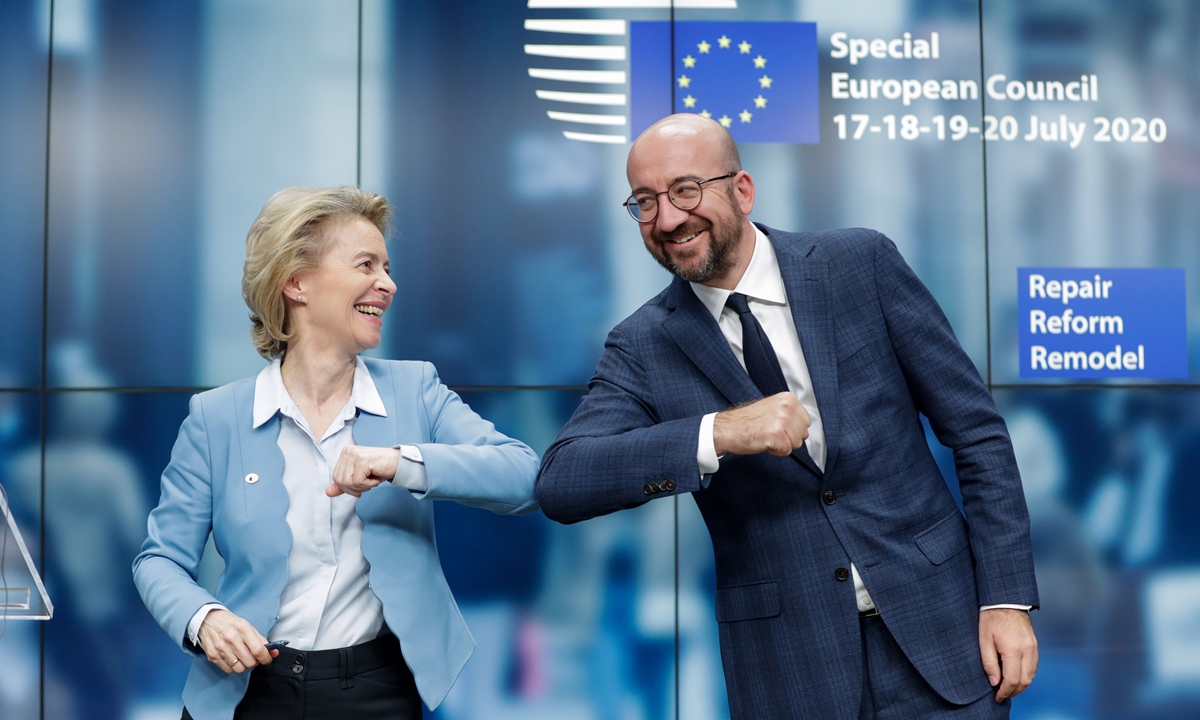Landmark EU deal sealed
Source: AFP Published: 2020/7/21 16:58:40
750 billion euro stimulus approved amid 90 hours

European Commission President Ursula Von Der Leyen (left) and European Council President Charles Michel bump elbows at the end of a news conference following a four-day summit at the European Council in Brussels, Belgium on Tuesday. Photo: AFP
European Union (EU) leaders on Tuesday approved a landmark stimulus package to fight the withering aftershocks of the coronavirus outbreak that has sunk Europe into its deepest recession in history.The 750 billion euro ($858 billion) deal was sealed after four days and nights of intense negotiation that saw threats of walkouts and fierce intransigence by the Netherlands.
"Deal!" tweeted EU Council Chief Charles Michel, whose job was to guide the tortuous talks over more than 90 hours.
The package, seen by AFP, was made possible by the crucial backing of Germany and France and includes the biggest ever joint borrowing by the 27 members of the bloc, something that had been resisted by Berlin for generations.
The deal is a special victory for French President Emmanuel Macron who came to office in 2017 and committed to strengthen the EU, but had struggled to deliver against member states with less ambition for the seven-decade-old EU project.
He hailed "a historic day" for Europe.
The package will send tens of billions of euros to countries hardest hit by the virus, most notably heavily indebted Spain and Italy that had lobbied hard for a major gesture from their EU partners.
Their call for solidarity was met with the fierce opposition of the "Frugals," a group of small, northern nations led by Netherlands, who believed strongly that the stimulus package was unnecessary.
The frugals were also deeply apprehensive of sending money to southern countries that they see as too lax with public spending.
To meet their concerns, payouts from the package will come with important strings attached - a hard pill to swallow for Rome and Madrid who deeply resisted anything resembling the harsh bailouts imposed on Greece, Portugal or Ireland during the debt crisis.
The frugals were also enticed with heavy rebates on their EU contributions, furthering a practice first offered to Britain decades ago, when it was still a member.
The recovery package will complement the unprecedented monetary stimulus at the European Central Bank, that has largely succeeded in reassuring the financial markets despite a catastrophic recession in Europe.
Overall, the deal will dole out 390 billion in the form of grants to pandemic-hit countries.
That was lower than an original 500 billion euro proposal made by France and Germany. Another 360 billion euros was to be disbursed in loans, repayable by the member states.
AFP
Posted in: EUROPE